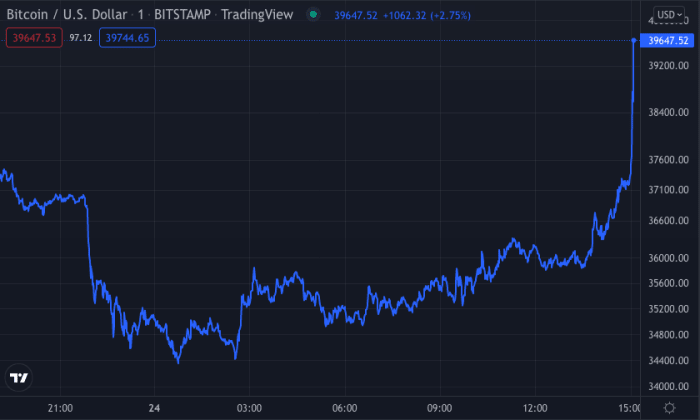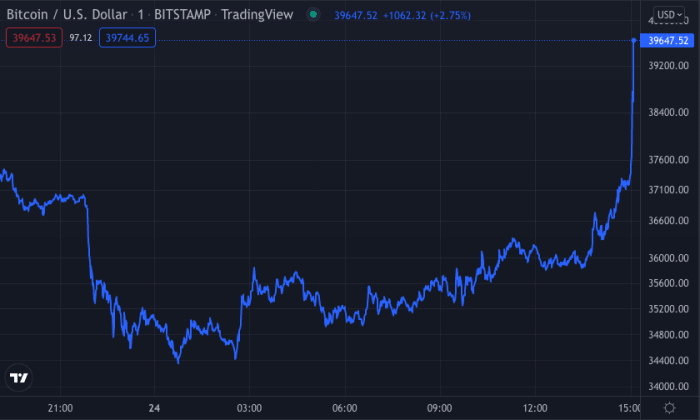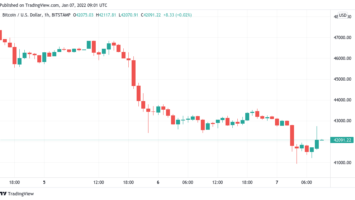The U.S. will block five of the biggest Russian banks and freeze all assets they hold in America, worth over $1 trillion, President Joe Biden said in a press conference Thursday.
U.K. prime minister Boris Johnson imposed similar sanctions earlier Thursday, freezing the assets of all major Russian banks and cutting them off from the U.K.’s financial markets, reported the Associated Press. The prime minister also seeks to bar Russian companies and the Russian government from raising money on U.K. markets, a measure Biden echoed in his press conference.
The blockade is part of a series of sanctions that the U.S. and G7 leaders have agreed on to attempt to contain further movements by Russian President Vladimir Putin after he ordered his troops into Ukraine – an escalation on weaker sanctions imposed earlier this week.
Biden said that despite multiple reports indicating a probable ejection of Russia from international payment system Swift, there are no plans to go down that path currently. The U.S. leader’s remarks contrast Johnson’s view as he pushes “very hard” for Russia to be removed from the Swift payment system, according to a Thursday report by the Financial Times.
“The sanctions we have imposed exceed Swift,” Biden said.
Despite not having removed Russia from Swift, Biden said the U.S. and G7 leaders are in agreement to “limit Russia’s ability to do business in dollars, euros, pounds, and yen.”
Bitcoin regained $39,000 in a quick rally following Biden’s comments after dipping below $35,000 Thursday morning.

Bitcoin erased all of its losses following Biden’s address to the nation that announced economic sanctions to Russia in an attempt to stop Putin from advancing further into Ukraine. Source: TradingView.
Biden added the U.S. is also targeting Russian commerce in an attempt to “cut off half of Russian high-tech imports” thereby hurting the country’s access to products and technology.
Russia’s invasion of Ukraine has led to a “complete rupture” in relations between the country and the U.S., Biden said.
Economic sanctions and supplies are all the U.S. will provide Ukraine with at the moment as according to Biden the country will only get troops involved “if Russia moves into NATO countries.”
The U.S. has sent and will send additional troops to NATO countries near Ukraine, Biden said.
Despite not going down the Swift route, imposed sanctions still seek to limit Russia’s ability to trade internationally.
However, there is doubt about the effectiveness of Western sanctions as alternative payment rails like Bitcoin and cryptocurrencies become more widely used and potentially emerge as new tools for Russians and its billionaires to leverage, reported Bloomberg.
Bitcoin contrasts traditional payment systems as it sees and treats all users equally, making it a powerful tool for those under scrutiny of a totalitarian regime for example. However, as a tool it can also be leveraged by nations sanctioned out of Western payment rails.
“Neither dictators nor human rights activists will encounter any censor on the Bitcoin network,” Matthew Sigel, head of digital assets research at investment manager VanEck, told Bloomberg.
As Russian financial institutions get sanctioned and prevented from doing business with foreign countries, citizens might find themselves trapped as their ability to send and receive money is hurt.
Arguably even more troubling is the situation in Ukraine, where the central bank on Thursday temporarily suspended the country’s currency market, imposed limits on cash withdrawals and prohibited issuance of foreign currencies to the general public as the nation declared martial law, The Wall Street Journal reported.
In a geopolitical event where world leaders seek more influence and power, the citizens usually bear the costs. In today’s digitized and financialized world, monetary issues become more apparent as both attackers and those being attacked first resort to the financial system – either to restrict or seek asylum.
Bitcoin is a life raft to all of those under monetary restrictions worldwide, irrespective of the position they are in according to global geopolitics. The decentralized payment system enables anyone to maintain their ability to transact monetary value regionally or internationally, being immune to the policy tide affecting the traditional systems.
For law-abiding citizens who woke up today in a state of war, Bitcoin assures them their right to send and receive money, irrespective of their central bank’s cash withdrawal limits or their leader’s unpopular political stances.






















Comments (No)